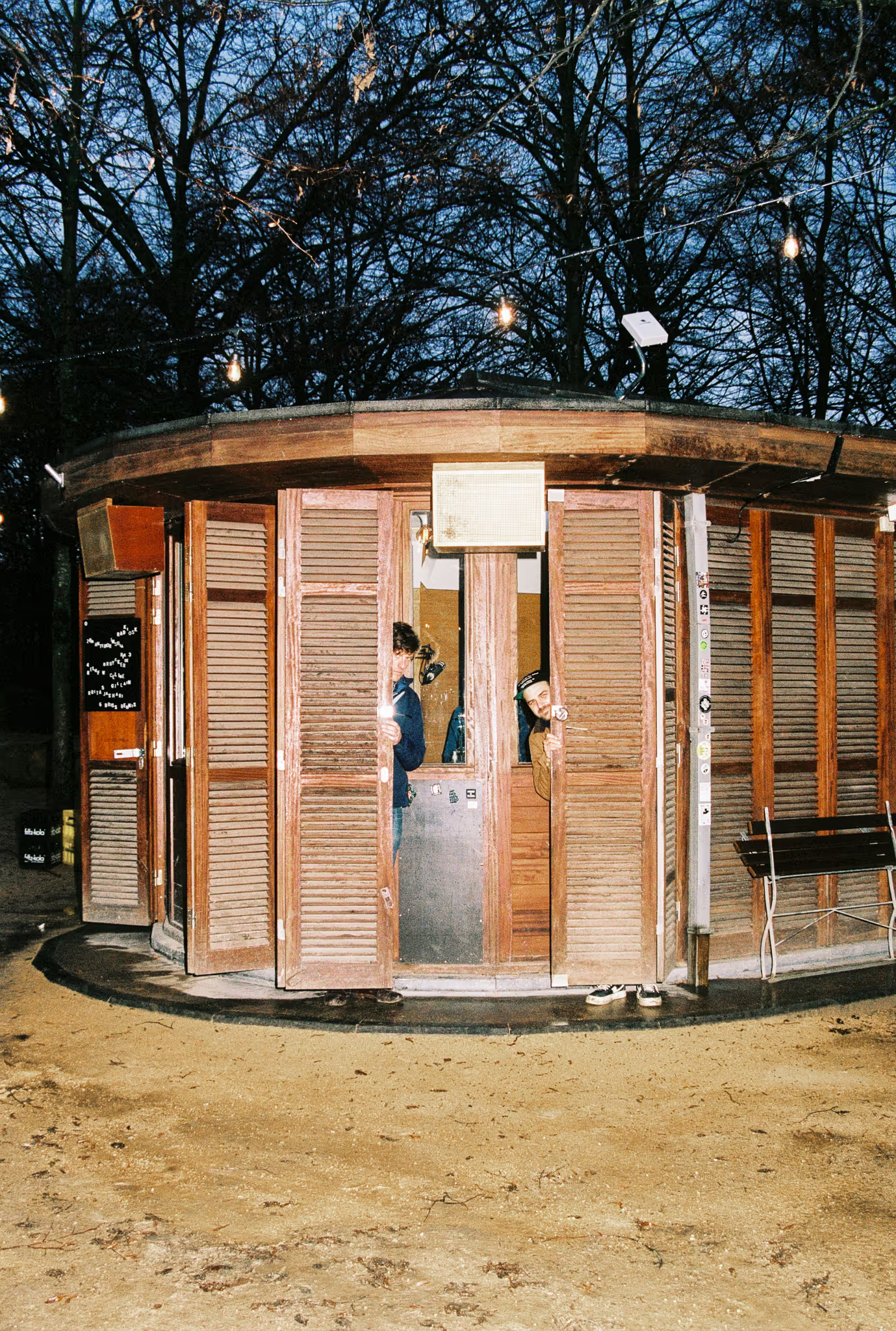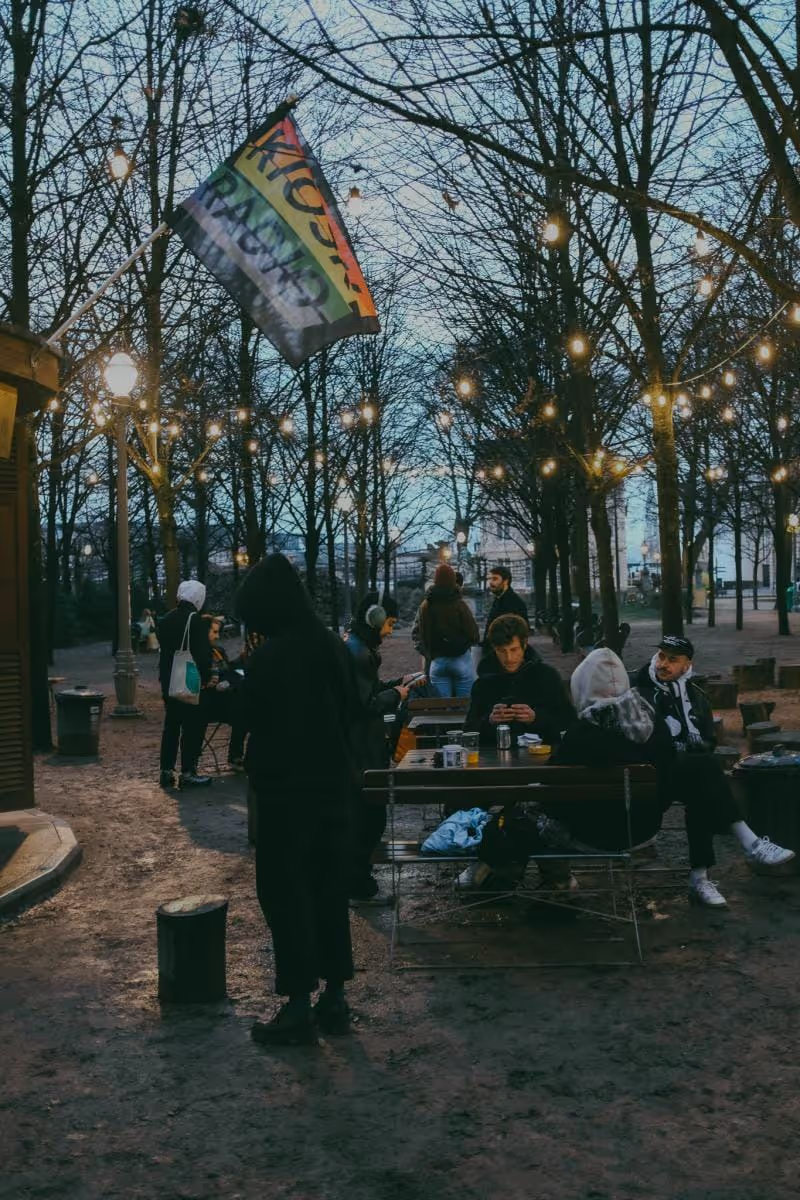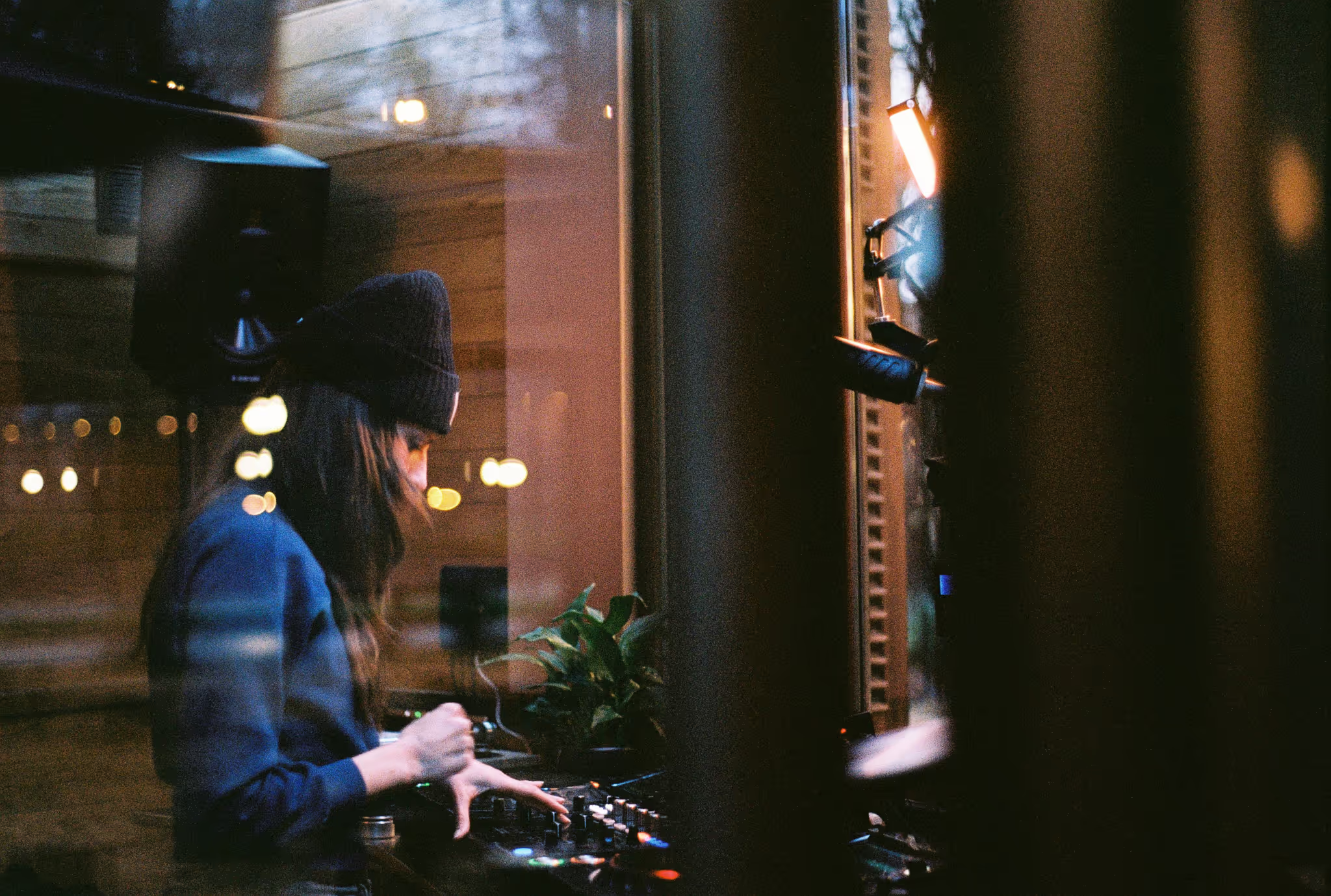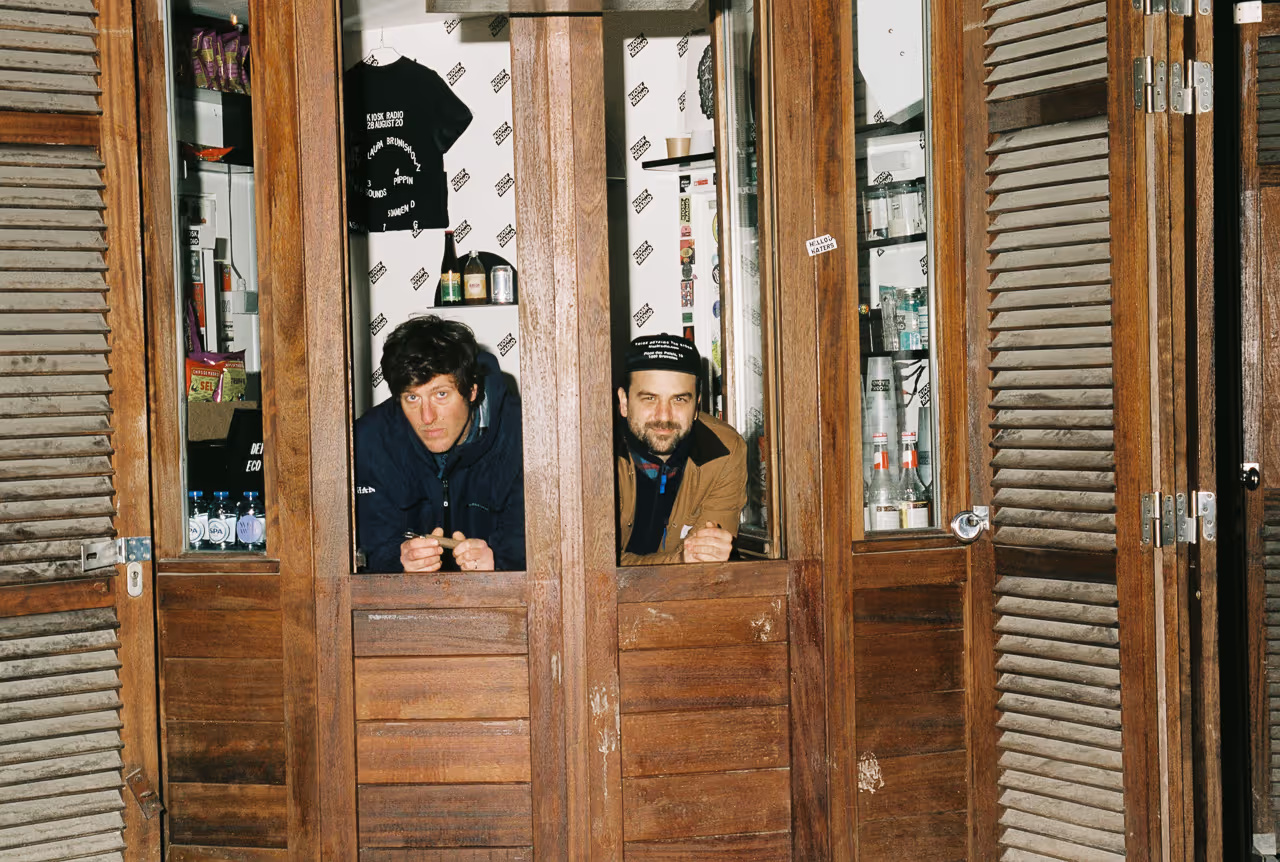





Text by Blurbs
Video & photo by Robin Stevens & Lukas Turcksin
Keytrade and Horst share DIY entrepreneurship as a common denominator. With ‘Their Way’ they inspire their shared philosophy through a content series. ‘Their Way’ offers the stories of DIY entrepreneurs at the forefront of art, architecture and music. We delve into the messy, yet inspiring and insightful process of entrepreneurship. We celebrate and feature compelling stories, challenging initiatives and examples of integrity from around the world.
It’s late November in Brussels and it’s raining, so not the best day for a stroll along the muddy alleyways of the Parc Royal. Yet two determined and warmly dressed figures await us outside the small wooden shack located at the coordinates (50.843438),(4.362687), niched between the outer fence and a shallow circular central pond. The “Kiosk Radio” flag is flying proud despite being thrashed about by harsh gusts of wind, and sounds emanate from the speakers hanging from the roof.
We sat down with Mickael 'Mickey' Bursztejn and Jim Becker to discuss how Kiosk Radio came to be, what challenges they faced in starting up Belgium’s most eclectic and successful webradio, just how hot it gets in the studio during summer, and what they have up their parka sleeves for the coming artistic season.
Horst: Tell us a bit about how you started the radio and how it all works.
Jim: It all started thanks to a friend of ours, and founder of The Lot Radio New York, Francois Vaxelaire. In 2017, he spotted the open call from the Brussels’ city administration and told us to go for it. So, a group of five of us got together, and made a proposal to run a radio station here. As you can see, we won the open call, which initially allowed us to occupy the kiosk in the park for a duration of five years. We were inspired by what was around at the time in terms of online radio: Red Light Radio (RIP), the Lot Radio, and NTS. The rest is history! We chose the name Kiosk because it is the same in pretty much every language, and it’s something you associate with a meeting place, where things happen in the park. It was that or the “sauna” because the temperature can rise to around 40 degrees in here during the summer.
Mickey: We began broadcasting four hours a day every afternoon, from 2 till 6pm. Each artist has an hour-long slot, there’s always a camera running, so curious people can look at the DJs on our video player, and interact with them and other listeners via the chat room. From the start we had this double experience: both online and offline. You could either come to the park and listen, or tune in remotely from your computer or phone.
Horst: Where did the idea for a radio station with a bar come from? Were you both involved in music?
Jim: I worked in restaurants and bars for two years in the States. And I was DJing a bit, not as much as Mickey, but music definitely was and still is a passion. Flash forward to a few years later in Brussels, and I was unsatisfied with my professional life. I was working in the arts, but I was sick of it. I loved clubbing and electronic music, but I didn't know how to mix all my interests and skills together. I didn't want to open a bar or club because I knew I couldn’t handle the stress and lifestyle. And so, when I saw the Lot Radio in New York, it seemed like the perfect compromise between working with electronic music and running a bar, but without the pressure of becoming a total night owl.
Mickey: I was producing and DJing a lot, to the point where I was lucky enough to travel and earn some money. However, things gradually got more commercial: I had a team, a booker, a publisher, a lawyer… I discovered that the whole system was actually crooked, which led to me being unhappy and stopping.
So, when I heard about the project to start Kiosk, I just approached the group and offered my help.
The Lot Radio was indeed a big inspiration. We were all seduced by their space in the middle of Brooklyn with all this crazy music broadcasted out of an old shipping container. Plus, they were self-sufficient thanks to the coffee corner. So, quite ambitiously, I thought we could maybe pull off the same thing in Brussels, even if it's not quite New York.
Jim: In the end, I think we can say that it worked out!
.avif)
Horst: How has the team evolved since those early days?
Jim: A few people have come and gone, but the main team is now made up of five people. We all do a bit of everything, but I'm mostly on the operations side of things. Mickey is the artistic director. Nicolas Bucci does communications and collaborations. Thomas Kok is on the admin and financial side. And recently, Louise Lombard joined as the bar manager and merchandise producer.
Mickey: We also have a big team of super-motivated volunteers who are crucial to the project!
Horst: How does this volunteer and intern program work and what has made it work so well? Can anyone apply?
Mickey: Because we didn’t have any money to pay ourselves or anyone else, the idea of volunteers came out of necessity. Their role entails managing the radio studio, greeting the DJs, taking their picture, writing an instagram post, and being generally kind and welcoming to the artists and public. They also have to set up the letter board with the day’s programme.
Our volunteers are really creative and integrated into the daily life at Kiosk. For example, we just released a record, and one of our volunteers, Bjorne Baeten, designed the cover. She also revolutionized the letter boards, which led to us making t-shirts with the same design. Every volunteer really brings something new to the project, revealing an unseen aspect of the radio.
Jim: The volunteer program creates a lot of human encounters and surprises. We had a Flemish girl who's not really into electronic music. We've had a French guy who has worked in web radio before. We had Niall, an Irish guy who works in a law firm. We had Sean, who’s a geographer. We have Donia who's in cultural studies. Some of them were in the music scene, some were DJs, and some of them not at all, surprisingly.
{{images-1}}
Horst: Did you encounter any major problems when starting out?
Jim: Since the beginning, we’ve had to figure out all the audiovisual and technical side of things ourselves. We learned the hard way, and now we’re better than ever! For example, we found out quite late in the process that there was no ADSL connection in the park, which was a major issue.
Mickey: We were about to start the project, and everything was ready. A few weeks before we were scheduled to open the radio we were like, "So let’s connect to the internet!" When you live in the city, you just take it for granted that the internet is everywhere, but actually, that’s not the case. So we ended up looking at wires in the park, scouring diagrams and maps… but there was no high-speed connection nearby for us to plug in to. We still actually use 4G to broadcast to this day.
Horst: So you just started a record label, Kiosk Recs. Why take on this extra task of having a label and how did you choose the first artist release?
Jim: It actually happened the opposite way around. It's the music that created the label.
Mickey: Everything we do is by accident! During the lockdown, we were invited by the local multidisciplinary center for arts and reflection, Beursschouwburg, to do a sound walk in the park. We found the right people to take on this challenge, PAL: a musical outfit composed of Arnaud Nourisson, Guillaume Kohn, and Pieter Polspoel: they're all regulars from the radio! They sent us 30 minutes of field recording and music about the park for the sound walk, but it was so good we decided it deserved more than being uploaded as a link on the internet. But we had no plans about being a label or releasing records on a regular basis.
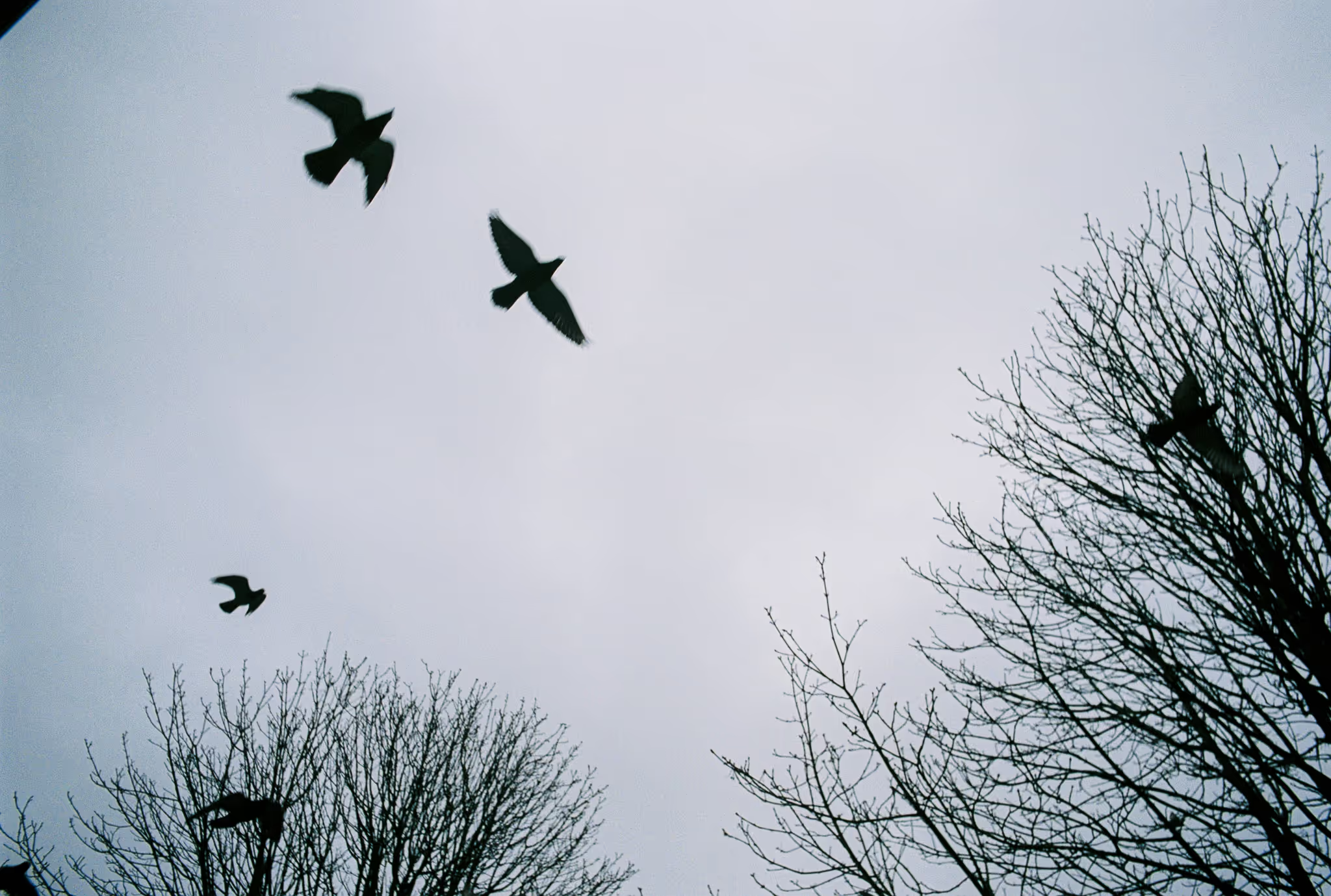
"It is quite surprising for artists to enter the radio via the toilets, then pass through the tiny bar, then finally into the studio. That's how the magic happens, thanks to this kind of forced proximity."
- Mickaël Bursztejn
Horst: How do you situate yourself within the Brussels (electronic) music community? Some would say that Kiosk was the glue that brought the scene together.
Mickey: When we were first talking about the project, people would be pessimistic and ask, "How are you going to do it? There are so many islands in Brussels and they're not communicating with each other."
Jim: I think that providing a physical space was the key to the success of bringing people together. And the fact that the radio is so eclectic. You have people who came to listen to one show who stuck around for the next, meeting new people on the terrace. It sounds stupid, but it was that simple. We weren't connected to a lot of artists and listeners, but gradually we became friends. It happened by drinking beers and appreciating music together.
Horst: You seem to be welcoming a lot of pretty famous DJs. Do you have any funny anecdotes or stories about the people who come to do a set in “the sauna”?
Mickey: We’ve had a lot of funny stories. There are often a lot of comic situations, especially in winter. Because it’s so cold outside, we’re all stuffed into the 5m2 of the bar or the studio, sharing intimate moments with the guests. It is quite surprising for artists to enter the radio via the toilets, then pass through the tiny bar, then finally into the studio. That's how the magic happens, thanks to this kind of forced proximity.
Jim: We had this famous DJ from Detroit who was smoking so much weed in the closed bar that we almost fainted.
Mickey: … And he wasn't talking, but was looking at cat videos on YouTube. I was literally dying. Another common and unsettling occurence are pedestrians asking the DJs for toilet paper or to sell them beers during their set.
Horst: How do these “big names” end up playing in your “small studio”?
Mickey: I'm always surprised to see that sometimes it's the bigger guests who ask me if they can come. We spend so much time here that we sometimes lose track of how the radio looks from the outside. Some artists are really enthusiastic: we had Egyptian Lover on the day after his set at a club in Brussels where he was playing from 4:00 to 6:00 am, and he came right on time at noon the day after with his record bag. That was really cool!

"When we physically leave Kiosk and organise events in other spaces, we like to promote locals and push boundaries. I think our city and its scene is super strong, but still internationally underrated."
- Mickaël Bursztejn
Horst: Can you tell us a bit about your new series called Outsiders?
Mickey: An important team member, Nicolas Bucci, moved to Jakarta, and wanted to find a way to stay active in the project. Add COVID to the mix, and we had lost connection with all the guests who would usually travel to the city and play on the radio. That’s how we came up with this idea of reaching out to labels from all around the world and asking them to have a monthly curated show. Now we are extending the series to work with new labels, institutions, and concert venues as well.
Horst: What is your approach to artistic programming and making sure it's diverse?
Mickey: We have labels and residents who have monthly residencies here, and they bring along different artists, rather than me selecting who plays each slot. The only thing that limits us is time, but in reality there's no real rules.
For example, I met one of our oldest residents, XOGN, selling vinyl at a flea market. He wasn’t interested in doing a show at first, but I insisted, and he’s rediscovered himself via the radio. Sometimes when I'm in a record store, and I see someone digging away in a shady corner, I’ll go over and ask them if they’d like to do a show. As for diversity, it’s really important for us to make the space safe, and to make sure that everybody feels comfortable here. We are a diverse team, a diverse community, broadcasting diverse music. It’s a whole package.
Horst: You collaborate a lot with the local scene, and even with us, Horst Festival! Could you recap our partnership a little bit?
Jim: We’ve been collaborating with Horst for quite some time already. Initially, they had a monthly radio show here at Kiosk. We then participated in the first edition of the festival on the current site in Vilvoorde with a morning broadcast live from the campsite, alongside the world famous Horst breakfast. Fast forward to this year, when we curated The Moon-Ra stage. A kind of crazy volcano-shaped construction designed by Leopold Banchini architects whose sides you had to crawl under to access, with a hole in the roof spouting smoke.
Mickey: It was an opportunity to give local artists who hadn’t ever been booked at a festival like Horst a chance to perform. And it was a success, a testimony that the level of local talent is really high. The festival itself is already quite niche in terms of electronic music, so we decided to go full-on and really program something different, unexpected. When we physically leave Kiosk and organise events in other spaces, we like to promote locals and push boundaries. I think our city and its scene is super strong, but still internationally underrated.
Horst: Do you have any other projects outside of the Kiosk coming up that you want to talk about?
Jim: We are currently elaborating a trans-European project called 25AV in collaboration with Italian web radio, Radio Raheem. Revolving around the idea of the “glocal” (global x local), the aim is to constructively collaborate and merge several online radios and communities around the media of music and video.
The concept is to elevate live streams and veejaying into a professional production, blending image and sound in the most qualitative way possible. It’s kind of a slow alternative to the overload of live streams we witnessed during the pandemic that didn’t necessarily create a lot of meaningful exchange.
.avif)
"For the future, I think we should continue what we’re doing in the best possible way. I want to improve what we do, but I don't want to see Kiosk starting random lucrative projects. I want to create mindful activities that support the scene. It might sound lame for some people, but not everything has to grow into something huge."
- Jim Becker
Horst: Where do you see yourselves and Kiosk Radio in 5 years?
Jim: We'd love to make the physical Kiosk bigger, but that's tricky because it's not ours. The team is constantly growing, and our activities are expanding, so we end up using the bar in the morning as an office, or the studio when there’s no one playing. This lack of office space is becoming more and more problematic, especially in winter.
For the future, I think we should continue what we’re doing in the best possible way. I want to improve what we do, but I don't want to see Kiosk starting random lucrative projects. I want to create mindful activities that support the scene. I want to continue to provide a platform, offering people the chance to play and share music. To make an analogy: if I were a cook, I wouldn't start up a hotel chain, I would want to just keep cooking. It might sound lame for some people, but not everything has to grow into something huge.
Mickey: Yeah. Grow small!
Horst: Do you have any advice for other cultural or social entrepreneurs starting a project?
Jim: Just do it! Which implies not being afraid and trusting others. There will always be people who are interested in the same project and willing to team up. Find help. Make a team. Take some risks. It's all about the path, not the destination.
Mickey: The more you give, the more you get.
